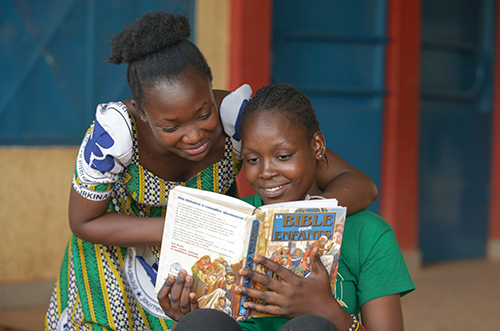Championing the Value and Power of Literacy for Children and Adults Across the Globe
First established by the United Nations more than 50 years ago, International Literacy Day is celebrated annually on September 8.
The motive behind the celebration of International Literacy Day is to assist the world community in encouraging literacy as an essential skill and tool for empowering individuals and communities. The current focus and objective is for all youth and a large percentage of adults, both men and women, to attain literacy and numeracy by 2030.
 The Passion and Power of Literacy
The Passion and Power of Literacy
Imagine childhood without your favorite book. A rainy day without that novel you can’t put down. Sending a child to sleep without being able to read them that bedtime story.
The ability to read is something many of us take for granted. We don’t think about it — but reading is a vital skill that doesn’t just bring joy. It brings life.
And when you can’t do it? It takes away.
Reading helps us develop. It helps us imagine. It helps us make our way in the world. But today, global literacy rates show that millions of children and adults don’t have the ability to practice and enjoy the basic and essentials skills of reading and writing.
Connecting the Dots Between Poverty and Illiteracy
The Importance of Literacy Skills
Literacy and skills development is important for the healthy development of every person and for the sustainable development of communities, countries and the world.
For millions of children and families in poverty, not being able to read or write means more than not enjoying books and stories or not being able to write their names. It drastically impacts their quality of life because poverty and education are intertwined.
Illiteracy takes away opportunities. It limits job potential. It increases the risk for trafficking and exploitation. It prevents children from dreaming.
"There remain today 758 million adults who cannot read or write a simple sentence…these women and men are more vulnerable to ill health, exploitation and human rights abuse. They are more likely to be unemployed and paid less. Unable to read or write, they are held back from their full potential, and whole communities are locked into vicious cycles of poverty that lay the conditions for violence and strife."
— Irina Bokova, Director-General of UNESCO
Why Can't They Read?
An education isn’t a given for children in poverty. In many areas of the world, school isn’t free like it is in other countries. It’s is an expensive luxury many families simply can’t afford.
Each day, parents must choose between making ends meet or sending their children to school.
Hard-working moms must decide if giving up that set of extra hands to run the family business is really worth it.
Dads must determine how to make that miles-long journey on foot to the schoolhouse.
And even the lucky kids who get to go to school have limited options, as their families must choose between putting food on the table, visiting the doctor, or extra expenses like books, uniforms, and supplies.
A Binding Reality
The reality is – millions of children in poverty can’t go to school. They will never learn to read or write. They will never have the freedom to dream.
But you can change that.
An education can provide children with a bright and better future. It instills hope and purpose. It encourages daring dreams and lifelong learning. It contributes to sustainable societies, and it brings healing and transformation for families, communities and entire nations.
"Literacy is a bridge from misery to hope…For everyone, everywhere, literacy is, along with education in general, a basic human right."
— Kofi Annan, former Secretary-General of the United Nations